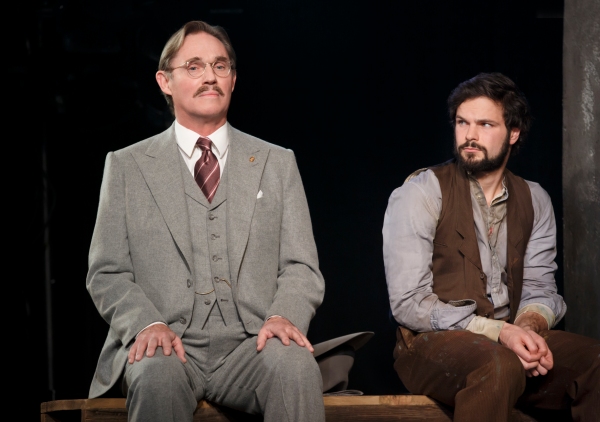
Incident at Vichy is not one of Arthur Miller's finest works, but attention must be always paid to his eloquent perspectives on evil, fear and morality. Celebrating the playwright's centenary, director Michael Wilson presents a straightforward production of the play at off-Broadway’s Signature Theater.
In 1942, a group of men are grabbed off the street in Nazi-occupied Vichy by French police and gathered inside a nameless detention center for questioning by German officers. Jeff Cowie has designed a depressing space, described by one detainee as the color of "dead clams." The men are obviously under duress, waiting for the call to go through the door and into the office for interrogation. Miller begins to examine how men act when trapped in a terrifying situation. At first, they avoid any communication with each other, just trading wary glances. When they finally begin to speak, it is about possibilities and rumors. Quick opinions gradually escalate into windy expositions. An edgy artist, Lebeau (Jonny Orsini), insists they are detained because they are Jewish. Confident Derek Smith portrays Monceau, an actor who feels his acclaimed performance as "Cyrano" will impress the Germans enough to get him off the hook. Electrician, Bayard (Alex Morf), is a communist who feels he may be helped by his politics since the Germans are hard workers. He also relates hearing of a train locked with screaming people inside. A waiter (David Abeles), serves meals daily in his restaurant to the Germans and insists that the Nazi major is a decent soldier. All these theories are brushed aside by Marchand (John Procaccino), a self-involved businessman, claiming these are merely routine identity checks to weed out any forged documents. Seated apart from the others is a Gypsy and a frightened 15-year-old boy. (Unfortunately the inherent drama of the boy's situation is dampened since the actor, Jonathan Gordon, is too old to resemble a teenager.) A second group of detainees includes a stooped bearded man (Jonathan Hadary) clutching a bag. The two major newcomers include Prince Von Berg (Richard Thomas), a likeable, poised Catholic nobleman who believes he was detained because of his background. Also a French psychiatrist, Luduc, is played with authority by a fiery Darren Pettie, who declares, "One way or another, with illusions or without them, exhausted or fresh — we have been trained to die.” Ludoc urges a breakout, stating that just a few men could overpower the guard at the door. Like many adolescents, the boy is eager to join him. The others refuse, denying the circulating rumors about extermination and camps. The ambivalent drunk German major (James Carpinello), while displaying a hatred for Jews, shows an ethical uneasiness for what is going on. Still, he follows orders. The high point of the play escalates with an intense conversation between Luduc and the Prince, who says, "There are people who would find it easier to die than stain one finger with this murder." Leduc's response is forceful. "Part of knowing who we are is knowing we are not someone else. And 'Jew' is only the name we give to that stranger. Each man has his Jew; it is the other. And the Jews have their Jews. And now, now above all, you must see that you have yoursthe man whose death leaves you relieved that you are not him, despite your decency. Until you face your own complicity with this . . . There is nothing and will be nothing." He adds, "It's not your guilt I want, it's your responsibility." What follows is stunning theatricality. While Michael Wilson’s staging is reserved, it manages to tighten the suspense and desperation. The cast, in their speeches and in their silent spaces, project fear and passion. A subtle move by Jonathan Gordon adds a believable poignancy to the boy who suddenly clutches a railing as he is pulled into the office. Cowie's dismal set lighted by David Lander gives the characters a focus and space to expound. Sound design by John Gromada dramatically magnifies moments of heart-clutching fear as the men are called one-by-one into the interrogating office and a shrill whistle as the shadow of a train passes by is a chilling ending. Arthur Miller's treatise on ethics, guilt and responsibility continues to prove Incident at Vichy, a one-act play written in 1964, still strikes with relevance today.
